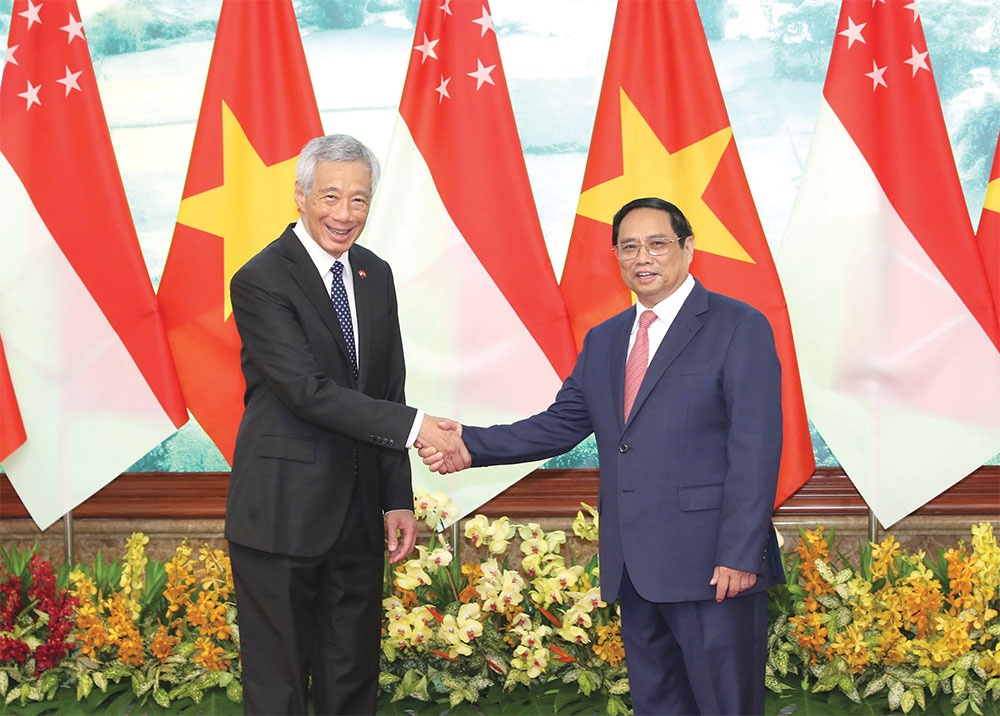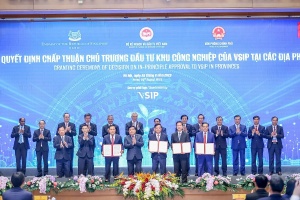Interest rises for Singapore’s businesses
 |
| Singapore’s Prime Minister Lee Hsien Loong (left) met with Vietnam’s counterpart Pham Minh Chinh last week, photo Duc Thanh |
During an official visit to Vietnam by Singapore’s Prime Minister Lee Hsien Loong last week, both nations agreed that they will elevate their current strategic partnership to a comprehensive partnership level.
The two countries also inked a deal on upgrading the Singapore-Vietnam Connectivity Framework Agreement and expanding its scope to include new sectors of infrastructure, energy, sustainability, digitalisation, and innovation.
As part of effort to materialise this new framework, Vietnam and Singapore have established a green-digital economic partnership, which serves as an umbrella framework to implement the four MoUs on energy, carbon credits, innovation and digital economy signed between Singapore and Vietnam agencies in the past year.
The Vietnamese government has set up a working group on implementing this partnership.
“We expect that Singapore will also found a similar working group, so that the two groups can work effectively, with meetings to be held to specify what and how to carry out the partnership as soon as possible,” said Minister of Planning and Investment Nguyen Chi Dung said at last week’s 17th Vietnam-Singapore Connectivity Ministerial Meeting in Hanoi. “Vietnam will continue to boost administrative reform and support Singapore’s projects.”
Enhancing ties
Vietnam is now proposing that Vietnam-Singapore Industrial Parks (VSIPs) be transformed from the traditional operation model to a new eco-model in line with Vietnam’s go-green strategy. Currently Vietnam is home to 14 VSIPs, of which nine have become operational.
“They should integrate the factors of green, circular, and energy-saving into their operations, while focussing on Vietnam’s priority sectors such as semiconductor, clean energy, e-commerce, smart city, and new material,” Minister Dung said.
VSIP was established in 1997, and it has become one of the biggest industrial infrastructure developers in Vietnam. With a system of modern infrastructure, the parks are serving as an important model for investment attraction and socioeconomic development in many localities. They are also a typical example for the long-term, sustainable, and effective relations between the two countries’ governments and business communities.
“According to results of Vietnam’s foreign direct investment (FDI) attraction since early this year and under fresh forecasts by experts, Vietnam continues to be the biggest magnet for new FDI flows in Southeast Asia. Thus, ample opportunities are there for investors to carry out industrial development projects in Vietnam,” said Le Thanh Quan, director of the Economic Zones Management Department under the Ministry of Planning and Investment (MPI).
“To catch up with this new-generation FDI flow, the Vietnamese government wants Singaporean developers including VSIP to continue creating infrastructure products that meet increasing demand and standards of producers, with the application of the industrial park model under the environmental, social, and governance criteria, and the eco-park model,” Quan continued.
Additionally, Vietnam and Singapore have also pledged to expand cooperation in the infrastructure sector.
“Vietnam is now in critical need of huge capital for infrastructure development, and Singapore wants to work with Vietnam about infrastructure projects in the country,” said Tan See Leng, Singaporean Minister for Manpower and Second Minister for Trade and Industry, at the meeting.
It is projected that Vietnam’s sustainable infrastructure will require investments of up to $25 billion per year to develop ports, expressways, urban areas, and green energy.
“There is potential for Singapore-based companies to work with Vietnamese corporates to provide financing, technology, and operating expertise for projects in the areas of green energy, smart cities, waste management, and wastewater treatment infrastructure,” said Jaya Ratnam, Singaporean Ambassador to Vietnam.
Minister Dung noted that Vietnam greatly needs investment capital for developing many types of infrastructure, such as road and metro lines, whose construction remains at a slow pace for decades.
“Despite large potential, we have been unable to exploit underground space in service of national development, especially in Hanoi and Ho Chi Minh City. We want to boost the implementation of these projects, but we need big capital,” he told Minister Leng last week. “Thus, we want to receive financial and technical support from Singapore.”
On August 24, Vietnam’s Ministry of Natural Resources and Environment licensed a joint venture between PetroVietnam Technical Services Corporation (PTSC) and Sembcorp Utilities Pte. Ltd. (SCU). The joint venture will be responsible for investment in offshore renewables in Vietnam and export of green electricity to Singapore.
In February, PTSC and SCU presented a joint development agreement for these activities. As a result, both companies will collaborate exclusively in investment on offshore wind farms in Vietnam with total capacity around 2.3GW to generate clean electricity for export to Singapore via subsea cables.
This collaboration not only marks the first-ever renewable energy cooperation between the two companies, but also strengthens the relationship between the two governments, realising the digital-green economic partnership between the two countries. It is expected that the Singaporean side will also soon licence this joint venture.
In October 2022, the two countries inked an MoU on energy cooperation, laying firm groundwork for them to implement energy projects more effectively, with favourable mechanisms and incentives offered.
Promoting investment
Several weeks ago, Minister Leng also visited Hanoi to attend the seventh Singapore-Vietnam Business Forum, which saw participation of over 1,000 people.
“This was the first time the event had been held outside of Singapore, and Vietnam was chosen as the location due to the strong business interest in Vietnam’s fast-growing economy,” he said. “This is evident in the strong turnout of businesses from Singapore and Vietnam, as well as from other countries.”
“Singaporean companies have been diversifying their investment portfolios in Vietnam in a wide range of sectors, from manufacturing to services, and from direct investment to indirect investment,” he continued.
According to Kow Juan Tiang, executive director for Southeast Asia at Enterprise Singapore, Singaporean businesses are considering Vietnam quite an attractive market.
“Vietnam wants to become a regional production base, and Singaporean companies want to diversify their investment markets, with Vietnam selected as a good destination for their expanded investments,” Tiang said. “Vietnam’s economic growth is on the rise, coupled with an increase in demand for Singaporean services.”
Singapore will send a delegation of companies to Vietnam to seek cooperation opportunities in the agricultural sector, whose bilateral trade turnover reached $400 million last year, including $293 million worth of Vietnamese exports. Both countries will also discuss possibilities of establishing some agricultural joint ventures, with Singapore likely supporting Vietnam to establish a high-tech agricultural research centre.
According to Vietnam’s Ministry of Planning and Investment (MPI), Singaporean businesses are recommended to boost the implementation of solutions on effectively using natural resources and cleaner productions, therefrom helping enterprises to reduce input and operational costs, and to improve competitiveness.
They should also place a priority on wooing industrial projects in line with Vietnam’s 2021-2030 investment attraction orientation and strategy. These projects are in the sectors of high technology, innovation, renewable energy, new materials, and research and development. They should also facilitate Vietnamese enterprises to partake in global value chains
Over the years, the economic ties between Singapore and Vietnam have grown from strength to strength. Bilateral goods trade grew by around 11 per cent per annum from $15.45 billion in 2018 to $23.14 billion in 2022. Bilateral services trade ascended by around 14 per cent per annum from $3.25 billion in 2017 to $5.47 billion last year. In 2022, Vietnam was Singapore’s 11th largest trading partner.
According to the MPI, in the first eight months of 2023, Singapore became the biggest foreign investor in Vietnam, with total registered capital of more than $3.6 billion.
Singapore is now Vietnam’s second-largest foreign investor, with total registered capital of about $72.7 billion as of August 20. This has also made Singapore the largest ASEAN investor in Vietnam, followed by Thailand ($13.6 billion), Malaysia ($13 billion), Brunei ($949.8 million), Indonesia ($646.5 million), the Philippines ($607.6 million), Laos ($71.1 million), and Cambodia ($70 million).
 | Innovation name of the game in Singaporean tourism Through innovative collaborations, advantageous e-visa policies, and a pioneering emphasis on sustainability, the future of tourism between Vietnam and Singapore has never looked brighter. Serene Ng, area director for Vietnam at the Singapore Tourism Board, unveiled dynamic strategies poised to revolutionise tourism exchange between Singapore and Vietnam in an exclusive interview with VIR’s Celine Luu. |
 | Vietnam and Singapore deepen collaboration on smart and sustainable industrial parks Singapore’s Sembcorp Development, a wholly owned subsidiary of Sembcorp Industries, and its state-owned joint venture partner in Vietnam, Becamex IDC Corporation, announced the addition of four new Vietnam Singapore Industrial Parks (VSIPs) on August 29. |
What the stars mean:
★ Poor ★ ★ Promising ★★★ Good ★★★★ Very good ★★★★★ Exceptional
Related Contents
Latest News
More News
- Vietnam sets ambitious dairy growth targets (February 24, 2026 | 18:00)
- Masan Consumer names new deputy CEO to drive foods and beverages growth (February 23, 2026 | 20:52)
- Myriad risks ahead, but ones Vietnam can confront (February 20, 2026 | 15:02)
- Vietnam making the leap into AI and semiconductors (February 20, 2026 | 09:37)
- Funding must be activated for semiconductor success (February 20, 2026 | 09:20)
- Resilience as new benchmark for smarter infrastructure (February 19, 2026 | 20:35)
- A golden time to shine within ASEAN (February 19, 2026 | 20:22)
- Vietnam’s pivotal year for advancing sustainability (February 19, 2026 | 08:44)
- Strengthening the core role of industry and trade (February 19, 2026 | 08:35)
- Future orientations for healthcare improvements (February 19, 2026 | 08:29)

 Tag:
Tag:



















 Mobile Version
Mobile Version